- Home
- M G Vassanji
What You Are Page 2
What You Are Read online
Page 2
What was it about the parrot, I asked her once, some years later. “She was feeding her parrot all the time but told me I was eating too much.” Her imitations of my sister-in-law Saida, cooing at her parrot, “Here, parrot, eat your foodie…” were actually funny. Mother spoke her mind easily. She came from a place and time where every morsel was counted, and did not understand spending resources on a pet.
A few years afterwards Mother returned to Canada with Salim, the last one to emigrate. Not happy in Calgary in the basement of his large doctor’s mansion, she moved out. It was a mistake. Salim, hinting at his circumstances at home, told me, “If she moves out, she will not be able to return.” Why? I wanted to ask. She’s your mother! But the rejoinder was obvious, she was mine too, what was I doing about her? I preferred to live in downtown Toronto in a house too small; she would not have managed the stairs. I would have to convince my family that we should move. Excuses apart, I should face this, I had lived away from her for too many years.
But she did move to Toronto eventually, to her own apartment before ending up here.
* * *
—
The doctor comes, gives a quick look around the room, then lands his gaze on my mother. “Did you give her the morphine?” he asks. A middle-aged Chinese man, his hair is ruffled. There’s no expression on his face. The Filipina nurse who followed him in has gone around to the other side of the bed. “Yes,” she says. “The family consented.” “We should increase it,” the doctor says. He could be checking inventory. He turns around and with a quick nod towards me leaves. We have an understanding.
I had already signed a guardian’s consent not to revive her unless advised. But morphine is that extra step to ease her into death, because we’ve decided against inserting a tube through her nose to help her breathe. She would hate it, I am certain. She would say, I don’t want to live under such conditions. But would she mean that? Did she understand the consent when I explained it? Had I even explained it clearly enough? The morphine seems the right decision to make, we would make it for ourselves if we had to. Still, that doubt remains, to niggle at the mind. Isn’t this too easy? Haven’t we been in a hurry all along? I don’t want to be the one to give the final go-ahead, Yes, more morphine, let’s gently push her off, but I am the son present, the decision is mine, and the rest are all happy for me to make it. They’re waiting, eyes upon me. It’s all right, it’s what she would have wanted, but you decide. I look at the nurse and give my nod.
* * *
—
She’s calmer, breathing steadily. Mariam, the companion, starts the prayers again. A diminutive woman, much smaller than the others, she carries the authority of experience and piety. Her open palms come together in front of her, her face pinches, and her eyes close. The others follow suit, the heads drop, the chorus begins, Allahuma salli ala…Mariam’s approach has always been practical: Your mother is waiting to go; not, We should make her happy and understand her. When Mother imagined the bogeyman who captured young people and held them prisoners, Mariam advised me that the mind was gone, and the old woman would follow soon. But the mind was not gone. My mother would smile when I came, her face would gradually light up, then we would chat. Sometimes about that bogeyman. I understood exactly who it was that was following her even into death.
My second sister, Safia, made it up to high school graduation, when suddenly Mother convinced her to accept a proposal and married off the eighteen-year-old to a man fifteen years older. Why, when she knew that his first wife had left him only a couple of weeks into the marriage? He was of a wealthy family, and they made promises…they would take care of Safia’s education, give her a better future than our mother ever could…and perhaps she hoped that her lot too would improve? But he was abusive, and all the promises made to us were quickly forgotten. Weeks after the wedding he hit her for not ironing his shirt properly. Mother never forgave herself. An eighteen-year-old given away just like that. My sister could have refused the proposal, but she was young and also swayed by the promises. She could have divorced him, but she stayed for the first child, who came a year later, then the next two.
This, the bogeyman who stole children.
The prayer stops, Mother keeps going. But she has slowed down. Everyone’s noticed, and there’s a hush in the room. The nurse has already gone.
Mum, you should see New York, I’ll take you there! You’ll be wowed—do you know there’s a building there with more than one hundred storeys! Go on, how can that be. Really! If you say so. And I’ll show you my university! All right.
She seems to have surrendered. “All right, it’s time,” someone says. And again the prayers begin, more frantically. I stand up and put my hand on her chest. My awkward goodbye. If only I could have expressed my love more obviously. But you knew it, Mum. I was the laal, after all.
There comes a commotion from outside, an unusual activity breaking the silence, and a few minutes later my brother Salim breezes in with his daughter. Officious as always—the doctor—he asks, “What’s up? She’s on morphine?” We nod. He goes and puts his hand on her head. She stops breathing.
* * *
—
An hour later, two young men and a woman from our Funeral Committee arrive and take over. We don’t have to do a thing, they’ll make all the required arrangements. We shouldn’t go near the body, we’re warned, she’s theirs now. We should all go home and rest. How can I complain when it’s all so convenient and easy? That’s how it is, the dead dispatched swiftly and anonymously with a minimum of fuss and ritual. They’re history. The next day at noon is the funeral. There are two of them, someone else has also passed away. The two funerals are perfectly orchestrated, like a military parade, and the Committee has sternly admonished the women not to weep. We believe in the spirit, not the body, is the line. And finally the short procession to the cemetery, way north of the city, snow squalls blowing around the graves. It’s vast, the size of a small town, each ethnic group to its own suburb with distinct headstones. Ours, next to the Ukrainian area, are all the same compact size and austere, laid out in neat rows. The headstones are foot-square tiles laid flat on the ground, all with the same inscription, a prayer to God. No, says a member of the Committee, you cannot have your own inscription on the stone. They all have to be the same, it has been decided. Your mother’s number is 1499.
MY BRILLIANT DAUGHTER
This lunch alone would have covered our month’s rent once. That was way back when we first arrived in Toronto, when she was growing up on Rosecliffe Park, tall and lanky, brilliant and brazen. Now she’s flown into town like a goddess on a horse and gathered twelve people around her. To greet them all at once, she said, but more likely to show off, to patronize those oldies in her family, the aunts and uncles who reached precisely nowhere in life. And look at her, how well she’s done, succeeded beyond our wildest imaginings. I’ll be president of IBM, she would boast. And Zera would say, Hush, you should not boast, or some devil will put a khunoos on your ambitions! Well, not IBM, but president of her own company is not bad. We put the world at her feet. Step on it! Go! She went. “Have some more wine, Dad!” Alcohol was haram then. Now only getting drunk is haram. A glass or two won’t hurt you. When exactly do you get drunk? It doesn’t matter, everything is different now. No rules left. Hell is not real. She leans over and refills my glass. Zera looks on, her face blank and judging. That’s an art. She will not let the bottle near her, lest the smell pollute her. What would her spiritual master the Missionary think? Indeed what. I’ve told her not to tell on me that I drink a little. He’s dead but guides her in her dreams and would be terribly upset. It was because he trusted me that she accepted my proposal. Way back when I went around the shops of Dar with samples of Jumbo shoes collecting orders.
If Jamila’s a goddess, that other one is her prophet. Urmila. Jamila and Urmila, how nicely they fit together. Two shoes in a box. Call us Jam and Urm. J
amie and Urmie. It took me three years to realize what that meant. Zera doesn’t know, though she thinks she does. So, what does a little wine matter?
“What are you smiling at?”
“Nothing.”
If our daughter who’s riding high wants to take us out, why not just the four of us, her family? But she must gather everyone she can, aunts and uncles and cousins. Here I am, come see me. Sophisticated, wealthy, liberated, shocking. I’ll treat you at an expensive restaurant. There’s a salad fork and an entrée fork, a soup spoon. A fish knife, a steak knife, a butter knife. Yes, now I know how to use them without letting the food go flying off the plate. She would kill me if that were to happen. One day she came home with a set of cutlery and trained us to use them.
Zera became totally flustered and finally gave up with, “Big spoon, little spoon? Left side, right side. What difference does it make?”
“Food is food, I totally agree,” Hanif said, sounding a little too wise. “Doesn’t matter how you eat it.”
And Jamila flew into a rage, “You shut up!”
Not long afterwards she stopped talking to him altogether. Will not hear his name, because he had made a comment to Urmie’s little sister Sharmie at a party. “No forgiveness, even for your younger brother?” Zera pleaded. “He’s the only one you have, besides us!”
“He’s not the only one I have. I have Urmie! Did you hear? He’s nobody to me, that sexist moron! And if you go on like this, you’ll be nothing to me either!”
Hanif is the only one of us not here. Zera’s favourite among the two, but still, Jamila’s kid brother. Isn’t blood thicker than water? Or as they said back in Dar, The one who only eats with you will not die for you, but the one who shares your blood, will. Something like that. No point bringing up Dar either. If fifteen years ago I had imagined what she would be like now, this is exactly how I would have drawn her. Tall and angular, short hair, smartly dressed. Bobbing up and down with energy, shooting a look here and a look there, laughing, looking like the top of the world. But she’s my daughter, I know exactly what’s in her mind: Does so-and-so like me, what does that other one think, what did Mom say to you about me, did she know it was my birthday…It’s no surprise she’s got an ulcer. She didn’t tell us about it, one of her cousins did, but we couldn’t go to the hospital to see her, for fear of a scolding: Who told you I was here? It’s nothing.
And she can read my mind. She comes over, puts a hand on my shoulder, bends over to ask, “Is everything all right, Dad?”
“Wonderful, Jamila! Everyone’s happy, we all love you!”
This “love you” is a new thing too. Everyone’s into “love you” now. Only lovers used to say that, do we have to say that, we who cleaned your shit?
She walks away smiling, with a sly look at Zera. She’s not forgiven her mother for introducing her to one man after another, until finally she said angrily to Zera, “Me and Urmie are a couple, do you understand?” Zera managed to squeak, “Urmie?” partly in confusion, but it sounded mocking, like she was laughing at the idea, it was too ludicrous. That was it for Zera. Life sentence.
My phone rings and I walk outside to answer it, catching my daughter’s sharp, suspicious eye throw a dart on my back.
“Yes, hullo, son. Yes, it’s a nice party, the food is good. Have you eaten? Do you want me to bring you a takeout?”
Hanif had found a job in Madrid and was doing well. Software. In my day that meant pillows. But he explained it to me, it’s like writing detailed instructions, as if to an idiot, telling a computer what to do. He always enjoyed Spanish in high school. But the Spanish economy tanked and he lost his job. Not long after, he called us and said his wife Sonia had left him. Taken the child with her. He was crying. And so we called him home.
Your brother’s back, he’s unhappy, talk to him. I don’t want to talk to him. He’s nothing to me.
How is such hatred possible? But it is. Our parents used to say that Kaljug, the dark age, was upon us. A mother will deny her child and a daughter will abuse her mother—that’s Kaljug. Well, the second part has come true anyway. When I think about it, when I look at the news sometimes, I realize that there are people who kill their brothers and even their fathers; even their daughters. In Kingston recently three girls from a family wiped out. Afghans. But we are a simple, straightforward family of four. Was the upbringing we gave them so flawed? It was not easy when we came, but we came for their sakes, we gave them love. There were the days of looking for jobs, and finally finding a menial one, at a clinic for drug addicts. Pushing trolleys of laundry. The racist remarks on the streets—Paki go home! The despair and humiliation. And to top everything, my public shame when a girl patient accused me of molesting her…and all I did was go to her assistance…where she was sitting on the floor crying. A picture in the Star. Those were hard times. If Missionary hadn’t put in the money for a Coffee Time franchise, I’d have been beating the sidewalks for who knows how long, searching for “Canadian experience.” Now with the old-age security for us both, it’s not so bad. We paid our dues. This is a good country. Disembowels you but looks after you.
But they were always loved. Love. What more precious commodity? Jamila and Hanif. Number One, both of them—though Jamila would come up with, But I’m the first Number One.
“Dad, are you listening?”
“Yes, hullo, son. It’s a bit noisy here. My mind drifts. We’ll be home soon.”
Back at the table, Jamila is at the head in the midst of giving a speech, while Zera is fidgeting with a fork. “Folks, allow me to publicly thank all of you who have played such an important role in my life…This lunch treat from Urmie and me is a small thank you!” She goes on to name Zera, thankfully, and me and her friends and cousins and uncles and aunts. And a few of her schoolteachers, one of whom is present. It is a nice gesture, but she does not name her little brother, who played with her on demand every weekend morning. Who yielded the TV control to her. And the last slice of pizza.
When it’s over, as we pause outside the restaurant, rather shamelessly Zera asks, “Jamila, how much was the bill?”
Jamila grins. “Too much for you. Nine hundred and twelve dollars.”
“That’s almost our month’s rent! But it was good, thank you. Very posh.” Then, a few steps later: “Why don’t you come home and meet your brother?”
The relentless mother. There’s no reply. Instead, Jamila gives me a peck on the cheek—“Love you, Dad!”—and disappears, her purpose accomplished.
She loves me, regardless of my defence of her brother, but she cannot forgive her mother. Her round, short mother who speaks her mind in simple terms and loves her son too. Zera has the courage, I am the coward. When Jamila told her about Urmila, she said to me later, “She can’t be my daughter.” And I said to her, “I can say that but not you.” The joke didn’t register.
“She could have been exchanged in the hospital—remember that Arab woman in the next bed who also gave birth to a daughter?”
“Are you serious, Zera?”
In the car, on our way home, I tell her that Jamila wants me to go to Lisbon with her and Urmila.
“Why don’t you go? She’ll never take me anywhere…But you take a holiday if she’s paying for it.”
“What work do I do that I need a holiday? We’ll go together somewhere.”
* * *
—
We come out on Highway 7 and drive down a busy Yonge Street this Saturday afternoon, through the Iranian and Korean markets. I enjoy seeing the bright colours and the squiggles of their writing on the store signs, and the photos and names of salespeople on the billboards atop the buildings. A far cry from the days of Paki go home! Zera says I drive too cautiously, which is a fine one coming from someone who doesn’t drive. The 404 is faster, no doubt, but it’s too fast for me; and there’s nothing to see on it but other cars, and slabs of concrete. Yonge Stre
et reminds me of Dar, the streets I walked on as a salesman. Zera prefers Markham and Thornhill, where everything is new, clean, and large, and very quiet; where all the people we knew at Rosecliffe Park have moved. But give me Rosecliffe Park anytime, where you can walk to Maqbool’s Indo-Pak Supermarket and buy bhindi or karela, or to Maqbool’s chai shop next door to it for bhajia and kabab, and the 100 bus takes you easily downtown as it’s always done. A lot of Muslims have moved here, men with beards and kurtas and kofias, and women in hijab and niqab, and there is the big mosque. The new Aga Khan Museum is not far away. Paki go home? This is home.

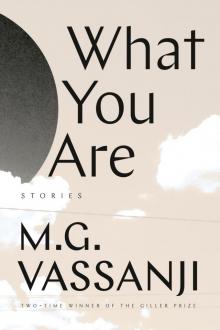 What You Are
What You Are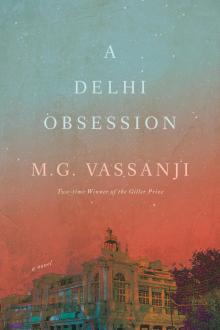 A Delhi Obsession
A Delhi Obsession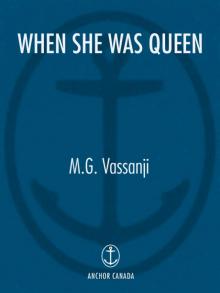 When She Was Queen
When She Was Queen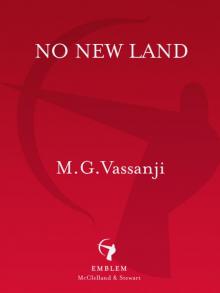 No New Land
No New Land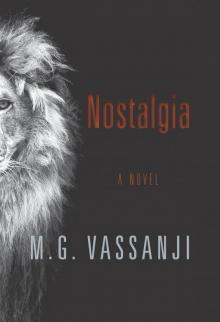 Nostalgia
Nostalgia Mordecai Richler
Mordecai Richler The Book of Secrets
The Book of Secrets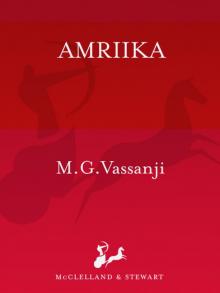 Amriika
Amriika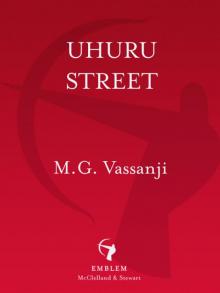 Uhuru Street
Uhuru Street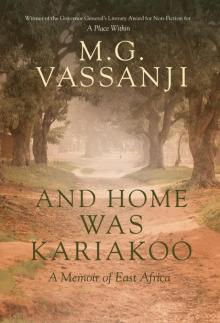 And Home Was Kariakoo
And Home Was Kariakoo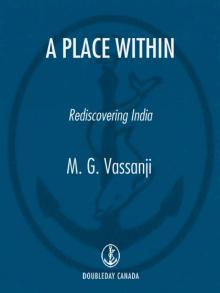 A Place Within
A Place Within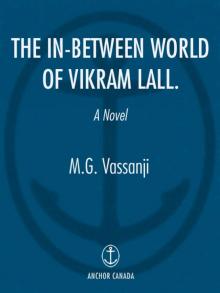 The In-Between World of Vikram Lall
The In-Between World of Vikram Lall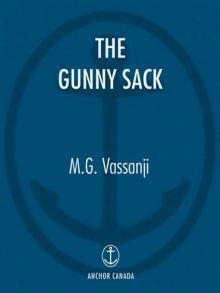 The Gunny Sack
The Gunny Sack